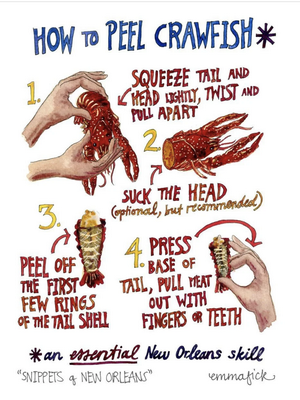Who made it?
April 2024
With “The Crayfish Ferris Wheel” by Brian C. Billings



With “Xeroseres: A Lesson” by Faith Allington


With “The Mood Begins to Shift” by Gerald Yelle


Dear Readers,
When we launched Waterwheel Review, we were keen to explain why we were so moved and motivated by the image of the waterwheel. Water stands for language, an ever flowing, renewable source; the waterwheel, an engine of labor, circles through, lifting words and then dropping them back into the running stream. Our magazine is a mill, we said, where the waterwheel powers writing and publishing. “We want—and need—to make things.”
For a couple of years, now, we have known that we can’t make enough of our own things while we give so much energy to the work of others. We have had to cut substantially the time and attention devoted to our own writing, and mostly we have been glad to do it, determined to find a way to repay our own work in the end. We never did find that way.
If we could quit our jobs and earn that income publishing this magazine, we would take that deal in an instant. But that’s not the world we live in. For many, many months we have known this, but we couldn’t accept it until now. And thank goodness for that.
Every single issue of this magazine has been a wonder that transported and enchanted us. We can’t say we gloried in every moment. We read or edited or built the site at times while sick, exhausted, grieving—that’s the nature of any publication. But we damn well gloried in every word, every paired image and sound.
Four years and thirty-six issues: What an honor to publish our contributors. What a privilege to offer stunning work to our readers. We must use the word pleasure, too, always rolled out to accompany “honor and privilege,” but pleasure isn’t strong enough, nor is gratitude nor joy nor blessing. For once we find ourselves at a loss for words to express precisely what it has meant to keep this waterwheel turning.
Maybe this will do it: How many times does anyone ever fully achieve the glittering, half-glimpsed vision floating above; that winking, flirting piece of art we ache to manifest? For the three of us, precisely this once.
We will keep making things and so will you. We started this magazine with the image of the waterwheel and a Jean Rhys quote, and we will end in the same way, as we thank you for reading and submitting, and wish you and yours all the very best:
Listen to me. All of writing is a huge lake. There are great rivers that feed the lake, like Tolstoy and Dostoyevsky. And there are mere trickles, like Jean Rhys. All that matters is feeding the lake. I don’t matter. The lake matters. You must keep feeding the lake.
—Claire, Suzanne, Cheryl
September 1, 2024: Waterwheel Review will stay online for the foreseeable future. It remains as it looked for the final June 2024 issue.
Literature Without Labels







I’m hurtling towards another birthday. At my age birthdays take on serious weight—Yet another of my vanishing supply of years logged, I think, even as I look forward to the day. I will meet with a good friend I rarely get to see, and I know she and my husband will make me feel particularly special, so all good. Even better if marking the day releases me from the state I’ve been in for many weeks. That’s what I have believed—that it’s this coming birthday that has been knocking me sideways. Because my thinking, lately, is all over the place, my writing is ragged, and my ambition is… fragile. But just today, as I let my fingers go to work on this keyboard, I realize I’m feeling what I’m feeling mainly because of something else.
What’s the opposite of hurtling? Inching. Creeping. Sludging. Not a word, but I like it, the mud of it, the cold and dense feel of it. My thinking is all over the place, my writing is ragged, and my ambition is fragile because I’m sludging towards the end of my manuscript, finally oh finally. Despite the incredibly slow pace the end is very much in sight. Pretty sure that’s it, because, I have to say, getting so close to the end, much to my sad surprise, doesn’t feel great.
For two years and three months, I’ve been thinking about this project. For a year and almost nine months, I’ve been writing it. I’ve neglected everything else in my life to stay focused on this work, and that glimpse of the completed manuscript has been out there like a glistening mirage, My Reward. My cool drink, soft place to fall. I’m reaching, reaching… and now I’m about to get there. I expected to feel fantastic! But no. When I do get there, I see now, I will be forcefully reminded that mirages are not real. A mirage is pretty brain-fog.
Well, at least it’s pretty. That’s what my mom would say. But fog is fog. You just have to wonder at it and hope it clears, soon.
When I say my ambition is fragile, I mean my ambition to finish this book and make it good is wobbling. Very quietly that voice is speaking up, the one that tells me I’ve been wasting my time. For about a year and seven months, when that voice spoke, I shouted it down. For weeks I’ve been unable to do that. Maybe because my thinking is all over the place. Or because I don’t trust this ragged writing. Or because I don’t need reminding that mirages are not real and I know, subconsciously, exactly what’s waiting for me. Whatever the reason, these things—the monkey mind, the rough draft that refuses to polish, the dawning belief that no one cares about what I’m writing—it’s all of a piece and each one feeds the other two.
Yeah, sludging along. Mucking through. Mudding my way to mirage.
Which is all to say that I feel like every other writer who has ever lived. I’m in a down-spell. I’m tired and worried all this work is for nothing. I’m in the sludge and I know YOU have been in the sludge so let’s just remind each other that down-spells don’t last, and tomorrow’s another day, and a cri de coeur about something this mundane really shouldn’t surpass 600 words.
The Barbara Feinberg quote we used for this issue—”It was as if, through that one sentence, she had wandered out of the yard of her usual language, and found herself in a different, mysterious, elegant part of town”—is from an essay I hope you’ll read and enjoy as much as I did. The essay is about a mother’s (thankful) restraint in wanting to critique her young daughter’s piece of creative writing, and what she, the mother, gains from attending to, instead, what her daughter likes about the piece. She marvels at the wonder the girl finds in one of the sentences, a sentence that hadn’t stood out in the mother’s reading. The sentence contains a semicolon, and this is what Feinberg says about that:
[I]t was one of the first times she’d ever ventured to use a semi-colon, and we both agreed that it added to the sentence’s allure. She loved semi-colons, she told me, and by way of expressing why, she put up one hand to denote Stop, and with the other hand, waved me to Go. A semi-colon seemed to tell you both things at once. Coincidentally, I had had a similar association to semi-colons as a child: the period over the comma was like a half-hinged door; it suggested a creaky lock on an old gate that you get to slip through into another world, even though you’re not exactly supposed to.
I love this description of the semicolon, and nodded as I read it, even as it reminded me that I had once written something about the semicolon, too, and it wasn’t favorable. Only a few days ago, I had been delighting in a semicolon I’d so perfectly placed—how could I ever have felt anything but love? It took this essay to remind me of the error of my former ways, though I couldn’t remember exactly what I’d said. Happily, the Internet remembers.
In a brief, written Q&A I did for Mid-American Review, who published one of my microfictions, I said this about the semicolon, in response to the request to share something strange about myself related to writing: “I almost never use a semicolon because I find the mark unattractive. It’s such a shame, because the work a semicolon does is so quietly lovely—its whole sentence-aura is understated elegance, inviting thoughtful, well-constructed sentences. Yet that blotty speck over the comma… ugh. I just can’t.”
I said that in the summer of 2015. I’m relieved that even then I understood well what a semicolon can do for a sentence. Thankfully, in some moment I didn’t notice, the semicolon acquired to my eye the loveliness on the page that befits the work it does, and I now have no idea why I ever thought any other way about it. When I was admiring that semicolon last week, it was because of my delight in how it distributed equal weight of significance on either side. Delicious!
A writer’s cri de coeur, mundane pique in the face of totally ordinary frustrations; it is the semicolon that is needed, here, yes? The thinnest, slightest, black-and-white metaphor to the rescue, in the form of a blotty speck over a comma.
There is a semicolon between rough draft and final. Between the 100,000-word blurt and finely pruned manuscript. I’m almost there, at the old gate, with that creaky lock on top. When I get there the mirage will disappear and I will remember that it was pretty fog; pretty enough to keep me going, foggy enough to keep me curious. Then I will remember that there is just as much meaning and purpose on the other side of the gate, and that fog always clears.
Whether you’re walking straight and sturdy in boots made to last twenty years or tottering along in stilettoes you damn well know you shouldn’t have even considered wearing, it doesn’t matter. Fragile, robust, who cares. Fast, slow, sludge and mud, what difference does it make? You’re here, now. And fog always clears.
—Claire Guyton



The writing god looking out for me is a lesser one, but that’s how I like it, the right god matched to size of ambition. I never wanted to sell a big book or be invited to a studio, so I don’t mind that my writing god needs a haircut and should work out more. She shows up when I really need her, shouting at me through her bullhorn. Right now she’s shouting about North Stars, so you have to hear about that, too.
In the last week, I’ve had three conversations with writers about how to approach their material. These conversations all led to the same place—a place I have been myself a few times. Most recently, ahem, these last couple of months, which is why I know these talks were arranged by my writing god, who clearly looks after my friends, too.
Again I find myself having to talk about being stuck and then how to get unstuck. It’s an evergreen topic for us writers, isn’t it?
Well, the first writer friend wasn’t stuck. She’s older and wiser and (much) tougher than I, and, from what I can tell, doesn’t really believe in “stuck.” Sometimes she writes very quickly, sometimes very slowly. Always she’s feeling her way. Because she’s a gifted poet who translates emotion and psychic energy into vibrant language that takes my breath away, I would be a fool to argue with her methods, so different from my own intensive, analytic, methodical pursuit of meaning. No, she isn’t stuck. She’s just moving very, very slowly right now, in an unfinished chapter of her memoir, and as we talked about why, I said something like, “I see why this piece is taking some time. Because it’s not clear, yet, why your North Star is leading you here.” She wanted to know what I meant by that.
My second writer friend is as stuck as any writer I have ever known. She doesn’t even like to talk about her project because it’s painful to admit how stuck she is, so we tend to talk around it. In this recent conversation we argued about what subgenre her unwritten book falls into; before that, we auditioned titles for it; on several occasions we have scanned the marketplace for anything like what she has proposed to write (there is nothing, her book idea is unique, I beg her (mostly silently) to please, please push past that first, beautiful chapter). As we discussed subgenre, I mentioned that our arguments are moot, really, because her North Star will determine subgenre. “What does that mean?” she asked, in the same tense voice she uses for all of these sideways conversations about the writing she’s not doing.
The third conversation was the one that pushed this notion of the “North Star” so firmly into the front of my mind, relieving the exhausted lesser writing god from duty. This writer friend asked me for feedback on how she should approach the next chapter of her memoir. She was flummoxed both about structure and content. Should she include the material about the thing that happened when she was twelve? If so, should she do it in a stand-alone chapter, or weave in a flashback, or…?
In reply to these questions, I asked her to remind me of what, precisely, her memoir is about, and why she feels compelled to write it. We had been talking for more than thirty minutes by then, our Zoom windows thick with opinions and reassurances and rambling digressions. Now we sat in silence while she looked away and then back at the camera and then away again. “It’s about… hmm. I’m compelled to write this book because… hmm.”
We all know about the elevator pitch. You distill your book down to its essence because no one, least of all an agent, is going to listen to a three-minute monologue about your novel or memoir. Certainly no one can market a book that can’t be described in one or two compelling sentences. But forget marketing, we’re nowhere close to marketing our unfinished books. Can you write your book—can you write it well—if you can’t describe what you believe you’re doing, every time you show up to the page, in one or two compelling sentences?
Those sentences might change. Your North Star might move a bit to the right. But you have to have one to keep you on the path. To know whether the current chapter you’re working on is carrying you off, away from view of it, and maybe it’s time to recalibrate; to put all that good material aside for another day and focus, instead, on that thing your mother said that never made sense but clearly speaks to the question, according to your North Star, this book is answering. Did I say your North Star? I meant mine.
I’m writing my current book, narrative nonfiction with lots of woven-in memoir, to explain why I was so dismayed by something that happened to somebody else. I should have been disgusted, outraged, moved to action, and I was. But I also lost sleep; had to sneak away to the bathroom at work to cry; could hardly think, for weeks, about anything else. This is not normal, I kept telling myself. This makes no sense. Except, of course, it does. The body doesn’t lie, so it has to make some kind of sense. My North Star tells me to make meaning of those strange weeks.
My friend who’s never stuck but sometimes writes very slowly, is figuring out, through the writing, whether this current chapter is taking her away, or just charting a new path toward, her North Star. The friend who can’t get past her first chapter is resisting the North Star that revealed itself in that material; if I or someone else or her own still, small voice can get her to see that, she’ll write a fantastic book. When my friend on Zoom finally found her words again and stumbled through why she thinks she’s compelled to write this memoir, and then realized, no, that’s not it, really… I asked her more questions, she went deeper, and in the end she began to glimpse her North Star, which, of course, revealed the way to take on that next chapter.
I’m no kind of god and I have no bullhorn, just this tiny space in the vast Internet, and, this instant, in your gigantic creative brain. Just pretend it’s no accident you’re reading this and let me ask: What is your North Star?
You’re knee-deep in a project you don’t know how to finish or you do know but lately it isn’t pleasing you. Have you considered the possibility that you have forgotten to take into account your North Star? Or that you haven’t fashioned one, yet? Or that the writing is demanding that you replace the one you’ve been following with a new one?
Maybe you haven’t started the project you keep thinking about. What are you waiting for? The right North Star?
From my co-editor, Cheryl, who puts her own “North Star practice” so beautifully (the poets, they can’t be stopped):
My North Star is the project title and/or an epigraph I have placed at the beginning of the work, often even before the project has taken shape. Even if the title changes, as it did with my current project, it serves as a reference point, a summation, a guiding idea that each individual poem speaks to in some way, however slight. The epigraph, which can also change, serves a similar purpose, providing me with another perspective on my material. And it’s affirming. It says, You have made a decision. You have a vision. You know where you’re going. I know where I’m going, I just don’t know how to get there, yet, and I won’t know I’m there until I reach it. But isn’t that the fun?
And now from our co-editor Suzanne, with a picture for us:
When I finished [her essay collection] Small Off Things and started thinking about my next project, a friend gave me a beautiful stained glass star and called it my North Star. It’s a physical representation on my desk that somehow soothes me as I work on difficult material.
Now, about my own recent struggle….
If you’re writing nonfiction, Truth is always crafted into the lines and light of your North Star, and it’s the part of mine that both keeps me on the path and gets me stuck. Did I not mention that sometimes your North Star, with its insistent shining and blinking, can demand you into a place of stillness? I was made to tell fictional stories, so my current approach to my nonfiction material is both temporary and often feels like fresh hell.
Truth is controlling and rude and ungovernable, and, sometimes, on top of all that, it’s boring. Down with truth, up with what is malleable and flirty and obedient and delightful. I want to remake dialogue, eliminate characters, change endings. But I can’t.
I look at my North Star and shuffle my feet. I fiddle with the tools of fiction even though I know I can’t use them. I get petulant and lazy and refuse to unearth the compelling from the boring. I don’t need to remake anything, I just need to work harder, I know this, how many times do I have to re-learn it?
Eventually, thanks to a small, lesser god, something happens, when I’m weak and stuck, to make me strong. This time it was three conversations with writer friends, all reminding me to re-orient myself to the search for a real-life answer to a real-life question.
Happy writing. If you’re not writing, best wishes as you look up, recalibrate, and get moving.
—Claire Guyton